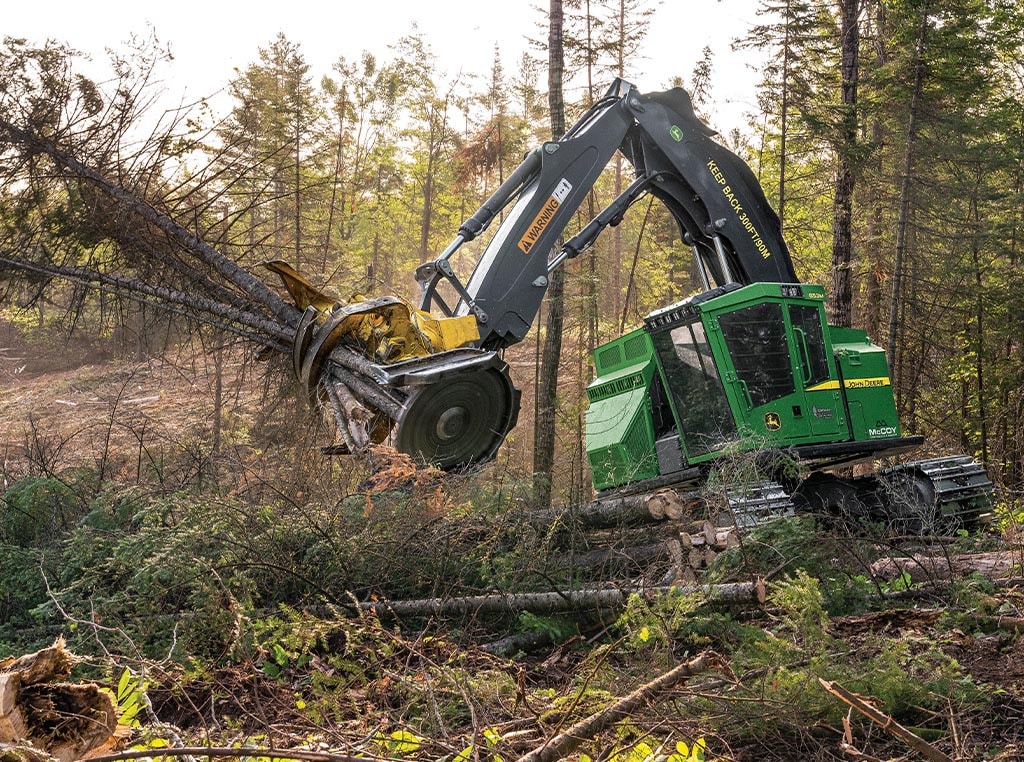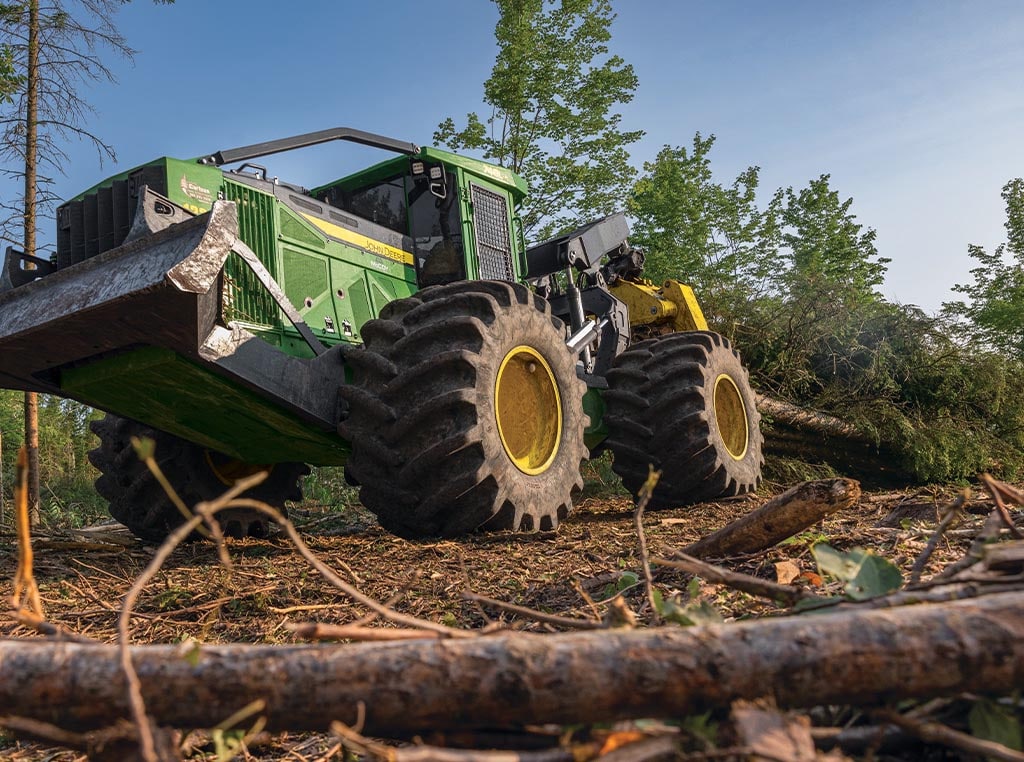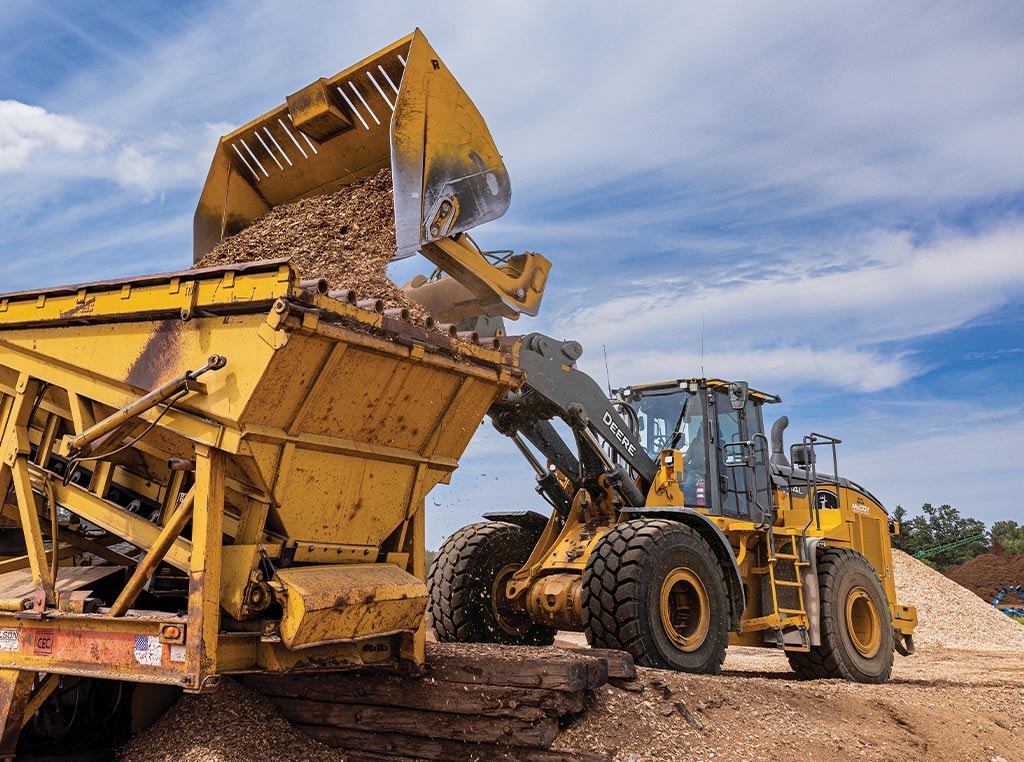Winter 2024
When the Chips Are Down
The people at Carlson Timber Products have each other’s backs
![]() 6 MIN READ
6 MIN READ
Dave Carlson, owner of Carlson Timber Products in Sandstone, Minnesota, never shies away from adversity. In the mid-2000s, biomass markets in Minnesota dried up, threatening his burgeoning chipping operation. Carlson pivoted to colored mulch and playground materials, and his business continued to thrive. “Forestry markets are a roller coaster,” says Clark. “But mulch has sold consistently. Everybody likes a nice yard.”
“He’s taught me a lot,” says his right-hand man and son-in-law, Field Supervisor Casey Clark. “I’ve never known anyone else like him who has no quit.”
To ensure his fledgling logging business wouldn’t fail in the early 1980s, Carlson worked 16-hour days, six or even seven days a week. “He’s hard to keep up with,” observes his local John Deere dealer representative, Tony Macke of McCoy Construction & Forestry.

“Casey and my wife Sue took over the business and kept everything rolling as if I was still there.”
Carlson exemplifies self-reliance. But he knows he can’t do it alone and is quick to give credit where credit is due. Never was this more clearly the case than in January 2021, when he became very sick with COVID-19. He was in a coma for over six weeks and in the hospital for four months.
It’s hard to keep a good man down, but Carlson had no choice. He was in great pain and needed to relearn everything, like walking and swallowing. Meanwhile Carlson Timber Products didn’t miss a beat.
“Casey and my wife Sue took over the business and kept everything rolling as if I was still there,” he recalls. “I’m very proud of that. From my brother Danny, who builds roads, to Field Manager Keith Osgood, to my son Dylan and Dave Johnson in the shop, everyone stepped up. It was business as usual. I couldn’t do it without any of them.”
Cashing in on chips
Carlson started Dave’s Tree Service when he was sixteen. During the wintertime his tree-service business slowed down, so in 1986 he started a logging company. He and his partner would hand-fell trees and skid logs using a cable skidder. Together they’d produce about two semitrailer loads of aspen a day.
Carlson had earned a reputation for being a top producer and getting the most out of his crews and equipment. “Buyers kept pushing us and we kept growing,” Carlson recalls.
At its peak during the early 2000s, the company was running five crews and producing 110 loads a day, or about 400,000 to 500,000 tons a year. During the early 2000s, the company also began a chipping operation to provide biomass to electric plants as mandated by Minnesota state law.
When Minnesota ended its mandate requiring electric plants to use biomass, Carlson found another market for his “off species,” such as pine and oak, that the mill didn’t want. He broke into the colored mulch and playground materials markets.
Carlson converted a barn into a colorizing unit and contacted a woman who marketed chips that are certified for playground safety. “She was excited about the high quality of our product,” he remembers. “Business shot up from there.”
Now when logging operations slow down at the end of winter, the company sets up coloring operations, providing work for the crew during spring break up. From April until the snow flies, the company focuses on producing mulch and playground materials, shipping about 800 semitrailer loads each year. The Twin Cities represent the company’s biggest market, although the company also ships to the Dakotas, Canada, and as far east as Green Bay, Wisconsin.

“We have to meet regulations about rutting. The L-IIs are balanced, so they float well and don’t rut as much.”
Stacking the deck
Logging in Minnesota means dealing with extremes. “It’s a fight,” says Clark. “On some days during the winter, temperatures can drop to 30 below. During the summer they can exceed 100 degrees.”
Clark is up to the challenge. “Some people don’t like the snow, but I enjoy it,” he says. “I like the pressure of clearing the roads and getting sites ready before crews arrive. It drives me.”
Carlson Timber Products does most of its logging during the winter when frozen ground conditions make it easier to log. The logging crew runs six days a week from November to March. “Winter is very important to us,” says Clark. “We overproduce and stockpile wood so we can keep up with the mill’s daily demand.”
The logging crew currently runs a John Deere 853M Tracked Feller Buncher and two Deere Skidders: a 748L-II and an 848H. “We’ve used John Deere forever,” says Carlson. “They’re king of the woods and, in my opinion, they build the best skidders on the market.”
“Flotation is great with our skidders,” adds Clark. “That’s huge in our area. We work in a variety of soils from sandy loam to clay, and we have to meet regulations about rutting. The L-IIs are balanced so they float well and don’t rut as much.”
Clark appreciates the service and support he receives from McCoy Construction & Forestry. “They really keep us up and running,” he says. “If we have any downtime, they’re very prompt about helping us. They monitor our machines using the John Deere Operations Center™ and contact us if we have low hydraulic fluid, low coolant, or other issues we can handle over the phone. If necessary, they can remotely monitor a machine to troubleshoot an issue. That helps save costly and unnecessary visits from a service truck.”
Whatever the future may bring, Carlson Timber Products will keep rolling. “This company’s greatest asset is its owners, Dave and Sue,” says Clark. “Even when the cards are stacked against them, they keep pushing. They have big hearts and care about everyone. They are amazing.”
Carlson Timber Products is serviced by McCoy Construction & Forestry Inc., Duluth, Minnesota.
Related Articles
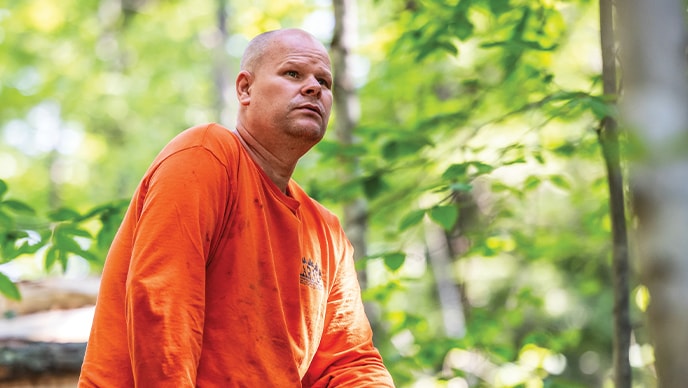
Never Back Down
Harju Logging relies on John Deere equipment and technology to navigate the tough Michigan terrain.
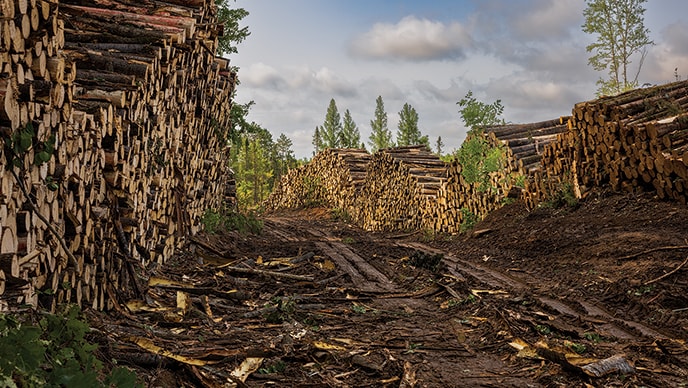
The Marshall Plan
Marshall Logging continues eight decades of logging by adapting to change and adopting new technology.
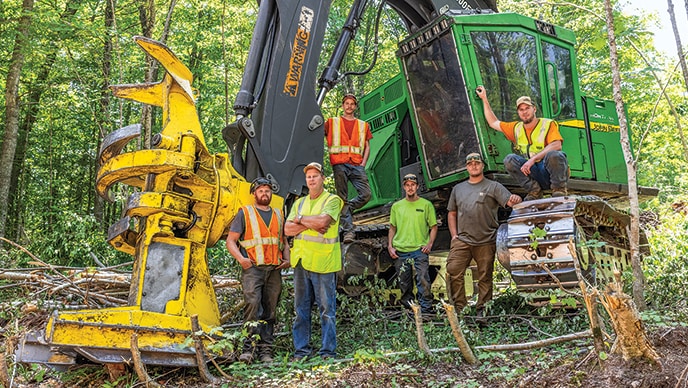
Front Man
A multigenerational logging company finds success by embracing teamwork and new technology.
Do you think your company's story would resonate with others in the logging industry?
SHARE YOUR JOURNEY

